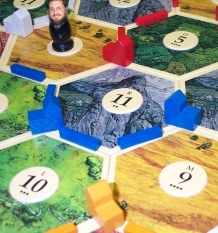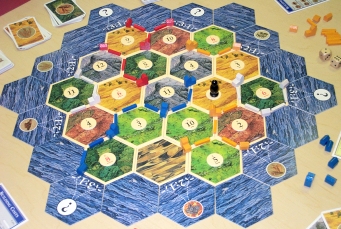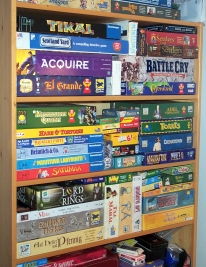 This
page is a collection of thoughts, observations, and links to expand your
gaming horizons. There are so many diverse and interesting games
in the world! If you think that what's in Walmart or Toys R Us is
all that's available, you're missing out what I consider some of the most
fun and fascinating games in the world. Have you ever heard
of "The
Settlers of Catan", "Bohnanza",
or any of these
games? Have you heard of game authors such as Reiner
Knizia, Wolfgang Kramer, or Klaus Teuber? If not, please read
on! You can also view the related Gettysburg
magazine or Harrisburg Patriot-News (page
1, page 2) articles.
This
page is a collection of thoughts, observations, and links to expand your
gaming horizons. There are so many diverse and interesting games
in the world! If you think that what's in Walmart or Toys R Us is
all that's available, you're missing out what I consider some of the most
fun and fascinating games in the world. Have you ever heard
of "The
Settlers of Catan", "Bohnanza",
or any of these
games? Have you heard of game authors such as Reiner
Knizia, Wolfgang Kramer, or Klaus Teuber? If not, please read
on! You can also view the related Gettysburg
magazine or Harrisburg Patriot-News (page
1, page 2) articles.
To me, the game is secondary to the players. If one player is inconsiderate of other players through lengthy deliberation or disparaging remarks, the player may win the game and lose the "metagame". The metagame is what happens above the game board. The metagame is cooperative and centers around mutual respect and value of others. There is a social element in playing a board game that is yet unmatched in multiplayer online games. If a person doesn't value time with others, there's many a good computer game to deeply engage and keep that person out of relationships and community... and that's a sad loss.
If I could coin and promote one gaming motto it would be "Spieler uber Spiele" (translated "Gamers over Games" or "Players over Games"). People are more important than games, yet in playing games, we express a value for interacting with each other. Just as eating is a natural activity for bringing people together, games bring people together, providing common experiences that are the building blocks of relationships and ultimately community.
For me, the ideal game involves several people, takes from minutes up to 2 hours for play, can be described in under 10 minutes, has beautiful components, and engages enjoyable talents of the players.
 Most
Americans don't recognize the fact that we have something close to a monopoly
in the American game market. Ironically, Hasbro,
which owns the rights to the game Monopoly,
also owns most major board game companies. Each year, this results
in new acquisitions from Parker Brothers and Milton Bradley long ago to
the Wizards of the Coast and Avalon Hill more recently.
Most
Americans don't recognize the fact that we have something close to a monopoly
in the American game market. Ironically, Hasbro,
which owns the rights to the game Monopoly,
also owns most major board game companies. Each year, this results
in new acquisitions from Parker Brothers and Milton Bradley long ago to
the Wizards of the Coast and Avalon Hill more recently.
One effect of this near-monopoly is stagnation in gaming innovation. New games are introduced much less frequently in the U.S. than in Europe. Given the proliferation of different "deluxe" versions and themed editions of older games (e.g. Monopoly), is it any wonder that America has grown bored with board games? I recently read that more than twice as many games of Monopoly are given as gifts than are ever played. I find this a sad waste. If consumers knew of better choices (and there are much better choices), I believe social games would regain popularity and many would experience a rebirth of a sense of community.
In Germany, one sees a very different picture. Several independent game companies thrive in competition with each other. Game designers (called "authors" in German) include both full-time professionals and hobbyist. Popular designers are minor celebrities and all designers have their names printed on their games just as book publishers acknowledge the authors on books. National game awards including the Spiel des Jahres ("Game of the Year") and Deutscher SpielePreis ("German Games Prize") encourage excellent new game innovations each year. Games are made with higher quality components and are generally designed to be playable by families in less than two hours, making them ideal for an after-dinner family activity. It is therefore no surprise that some of the very best American game authors prefer to publish their games in Germany.
The difference between American and German cultures with respect to gaming raises an interesting chicken-versus-egg question: Which comes first - a good product or an interested market? Surely the two are interdependent. Those I've known who have discovered the international game market have experienced a renewed interest in board games and have had more social interaction over games. I sometimes wonder if there will be a noticeable revolution in boardgaming, or whether the change I see underway will simply slowly permeate our markets and culture.
 In
the 80's, the only direct game purchase an American might make from a German
company would be the popular children's game "Memory" by Ravensburger (now
manufactured cheaply and distributed by Hasbro in the U.S.). Most
German designs that found their way onto major store game shelves were
distributed through U.S. game companies (e.g. "Scotland Yard" (Ravensburger)
and "Bandu" (Zoch) through Milton Bradley). In the 90's, small independent
game companies such as Mayfair and Rio Grande Games began aggressively
marketing high-quality German games through independent game shops.
Prices for imports remained prohibitively high, yet some games (e.g. Settlers
of Catan) made a significant impression. Online newsgroups began
to focus discussion on games primarily designed outside of the
U.S.. Internet
polls revealed such games to be online favorites. Funagain
Games* began as a small store in Ashland, Oregon dealing in used games,
and grew to become the Amazon.com of family strategy games.
In
the 80's, the only direct game purchase an American might make from a German
company would be the popular children's game "Memory" by Ravensburger (now
manufactured cheaply and distributed by Hasbro in the U.S.). Most
German designs that found their way onto major store game shelves were
distributed through U.S. game companies (e.g. "Scotland Yard" (Ravensburger)
and "Bandu" (Zoch) through Milton Bradley). In the 90's, small independent
game companies such as Mayfair and Rio Grande Games began aggressively
marketing high-quality German games through independent game shops.
Prices for imports remained prohibitively high, yet some games (e.g. Settlers
of Catan) made a significant impression. Online newsgroups began
to focus discussion on games primarily designed outside of the
U.S.. Internet
polls revealed such games to be online favorites. Funagain
Games* began as a small store in Ashland, Oregon dealing in used games,
and grew to become the Amazon.com of family strategy games.
The trend of growing interest in imported games continues. Largely unknown American designers of popular games have found a friendly reception and international recognition by publishing their designs in Germany. Whereas in the 90's, many German games needed to be provided with rules translations (although game parts are generally language-independent), it is now much more common for games to be simultaneously published in German and English. More and more Americans travel to the major game fairs in German (e.g. Essen), and much information is freely available almost instantly via the internet.
In short, market walls that divided American and German markets are slowly breaking down. Perhaps the most noticeable transition will occur when major store chains such as Walmart take part in this trend. I'm somewhat amazed that games such as "The Settlers of Catan" are still not easily available while more and more editions of Monopoly continue to proliferate. Chicken or egg, growing consumer knowledge of and demand for good quality games will inevitably have an impact on what we see on store shelves.
In the future, as the cost of computing drops ever lower, I believe we'll also begin to see interesting computer/board game hybrids that don't require a group to sit by a computer to play. New and interesting games will be facilitated and streamlined by more powerful small computing devices, leaving players focused on playing with each other rather than with a computer. An early well-known example of this was the 80's game "Dark Tower" which has a central tower with simple electronics involved with gameplay but not dominating the attention of the players.
Funagain Games* - the best of online game stores for these types of games. Be sure to check out "The Settlers of Catan" and "Bohnanza"!
Boardgame Geek - an online repository of rules, reviews, and materials relevant to all boardgames.
The Game Report - the online version of a quarterly print magazine dedicated to international games.
The Games Journal - a relatively new online boardgaming monthly featuring many informative articles, correspondence, and puzzles relating to boardgames.
Brett and Board - A Danish website on German boardgames in English. Now that's international!
Happy Surfing!
 Todd
Neller is an Assistant Professor of Computer
Science at Gettysburg College.
He grew up in Hampton, New Hampshire where his family played many games
together. Unknown to him at the time, some of the best of these games
were German designs. As many others of his generation, Todd gravitated
towards the infant computer game market when he got his first Radio Shack
TRS-80 Model I Level II in the fourth grade. At this time he also
began programming and gained a fascination with computers as problem-solving
power tools of the mind. Many years later, while completing his PhD
in Computer Science at Stanford University, Todd was reintroduced to the
world of boardgaming via the internationally award-winning game "The Settlers
of Catan". As a Community Associate of Stanford graduate housing,
he found game nights to be an enjoyable vehicle for building community
(second only to free meals in popularity). At Gettysburg, he is the
faculty advisor of Gettysburg College Christian Fellowship and enjoys playing
games with his students whenever possible. As an Artificial Intelligence
researcher, one of his main lines of research is computer game play.
In his spare time, Todd studies game history and game design. He
owns about 100 games and has rules to more than 1000.
Todd
Neller is an Assistant Professor of Computer
Science at Gettysburg College.
He grew up in Hampton, New Hampshire where his family played many games
together. Unknown to him at the time, some of the best of these games
were German designs. As many others of his generation, Todd gravitated
towards the infant computer game market when he got his first Radio Shack
TRS-80 Model I Level II in the fourth grade. At this time he also
began programming and gained a fascination with computers as problem-solving
power tools of the mind. Many years later, while completing his PhD
in Computer Science at Stanford University, Todd was reintroduced to the
world of boardgaming via the internationally award-winning game "The Settlers
of Catan". As a Community Associate of Stanford graduate housing,
he found game nights to be an enjoyable vehicle for building community
(second only to free meals in popularity). At Gettysburg, he is the
faculty advisor of Gettysburg College Christian Fellowship and enjoys playing
games with his students whenever possible. As an Artificial Intelligence
researcher, one of his main lines of research is computer game play.
In his spare time, Todd studies game history and game design. He
owns about 100 games and has rules to more than 1000.
* I am not receiving external compensation for the views expressed herein.
last updated 12/30/02
© 2002 Todd Neller